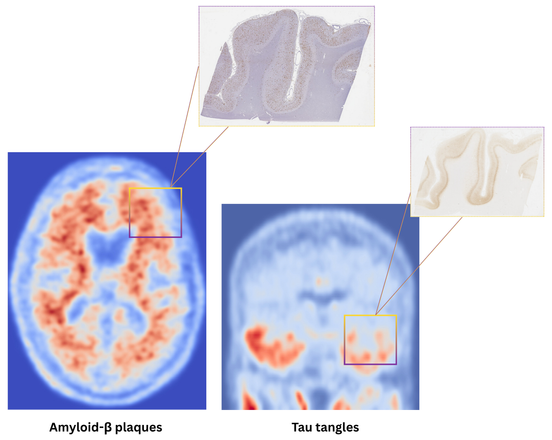Researchers at Boston University’s Chobanian & Avedisian School of Medicine have developed an artificial intelligence (AI) tool that can accurately detect key indicators of Alzheimer’s disease—such as the buildup of amyloid beta and tau proteins—using more accessible and affordable tests like brain scans, memory assessments, and health records.
 Image shows amyloid and tau PET scans, and corresponding protein (amyloid and tau) deposits in each. Image Credit: Boston University Chobanian & Avedisian School of Medicine
Image shows amyloid and tau PET scans, and corresponding protein (amyloid and tau) deposits in each. Image Credit: Boston University Chobanian & Avedisian School of Medicine
We used data from multiple international research cohorts, allowing us to predict the presence of these sticky proteins, and even checking specific brain areas.
Vijaya B. Kolachalama, PhD, FAHA, Study Corresponding Author and Associate Professor, Medicine and Computer Science, Boston University
While recent blood tests can signal the presence of Alzheimer’s-related proteins, they can’t pinpoint where in the brain these changes occur. This new AI model does.
To build the tool, Kolachalama’s team compiled data from seven research groups worldwide, covering 12,185 participants. The dataset included participants’ ages, health histories, memory test scores, genetic information, and brain scans. The AI model was trained to recognize patterns associated with the protein deposits typically detected in costly PET scans, and was designed to work even if some data points were missing. When tested on a separate group of participants, the model accurately predicted who had elevated amyloid or tau levels.
Kolachalama believes the tool could make Alzheimer’s screening faster, cheaper, and more widely available.
“The tool can help doctors quickly pick people for treatment with new drugs or to participate in research studies, thus saving time and money while reaching more patients who might not have access to costly and complicated tests. For the public, this means faster diagnoses, fewer unnecessary exams and hope for treatments that slow the disease, improving daily life for those affected and their loved ones,” added Kolachalama.
Beyond diagnosis, the researchers say AI could reshape how Alzheimer’s is staged, allowing for earlier detection and more tailored care plans—such as personalized diet or exercise programs—to help manage symptoms.
They also see potential for applying this approach to other conditions involving abnormal protein buildup, including frontotemporal dementia, which causes personality changes, and chronic traumatic encephalopathy, a degenerative brain condition often linked to repeated head injuries in athletes.
Journal Reference:
Jasodanand, V. H., et al. (2025) AI-driven fusion of multimodal data for Alzheimer’s disease biomarker assessment. Nature Communications. doi.org/10.1038/s41467-025-62590-4.